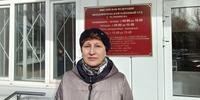The Case of Zhelavskaya in Chelyabinsk
Filter
- #
A judge of the Chelyabinsk Regional Court gives permission to conduct operational-search activities using audio, video and photo documentation at Olga Zhelavskaya's place of residence.
- #
As part of the criminal case against Vladimir Suvorov , security forces are searching Olga Zhelavskaya's apartment.
The investigation establishes that she, together with Vadim Gizatulin , was present at the service of Jehovah's Witnesses.
- #
Alexander Chepenko, investigator of the Investigative Directorate of the Investigative Committee of the Russian Federation for the Chelyabinsk Region, who initiated almost all cases against Jehovah's Witnesses in this region, separates materials from the case of Vladimir Suvorov regarding Olga Zhelavskaya, Vadim Gizatulin and Irina Mikhailenko into separate proceedings.
- #
Based on the results of the review of the materials, investigator Chepenko initiates separate criminal cases against Olga Zhelavskaya, Vadim Gizatulin and Irina Mikhailenko.
The decision to institute the case states, among other things, that the believers "acted out of religious motives" and participated in "collective worship consisting of successive performances of songs ... and praying to Jehovah God, studying and discussing articles and religious texts."
The guilt of Olga Zhelavskaya and Irina Mikhailenko, according to the investigation, also lies in the fact that they received fellow believers at home, and Zhelavskaya also "ensured ... fundraising... by providing a container box for the introduction of... donations".
- #
Olga Zhelavskaya is in the hospital after COVID-19 and a stroke. On this day, searches are carried out in the homes of Vadim Gizatulin and Irina Mikhailenko.
- #
It becomes known that the materials of the case against Olga Zhelavskaya are separated into separate proceedings.
- #
Olga Zhelavskaya's case is submitted to the Metallurgicheskiy District Court of Chelyabinsk.
- #
The prosecutor reads out the accusation with which the believer disagrees. She wants to make an appeal to the charges, but the court says that the woman will be able to do it later.
The defendant objects to the prosecutor's reading of the written testimony of prosecution witnesses and requests that they be summoned to court for questioning.
- #
The accused is still not allowed to read out her attitude to the charges. Three witnesses for the prosecution do not appear at the hearing, the written testimony of one of them is partially voiced.
- #
Zhelavskaya makes an attitude to the charges, the court attaches it to the case file.
An employee of the Center for Countering Extremism, D. A. Myzgin, who gave tasks to Lilia Ruzayeva, who portrayed an interest in the Bible, is being interrogated.
- #
Liliya Ruzayeva is briefly interrogated via video link, and her written testimony from similar criminal cases against Jehovah's Witnesses from Chelyabinsk is read out. Olga Zhelavskaya draws the court's attention to the existing contradictions in Ruzayeva's testimony, as well as to the fact that some of them are her assumptions.
- #
The court re-examines the attitude of the defendant to the prosecution and concludes that it contains arguments in favor of returning the criminal case to the prosecutor. The document states that there are no specific dates, circumstances and ways in which the defendant promoted superiority or called for non-recognition of state authorities and the severance of family relations.
The court asks Zhelavskaya whether she is requesting that the case be returned to the prosecutor. The believer agrees, the prosecutor objects. After that, the court interrogates the defendant.
- #
The prosecutor requests a sentence of 3 years in prison for the defendant.
The believer addresses the court with the last word, emphasizing: "I did not make calls to overthrow the political system, break up family relations or any other extremist statements. No quotes, no facts, no records, no victims."
The last word of the defendant Olga Zhelavskaya in Chelyabinsk - #

